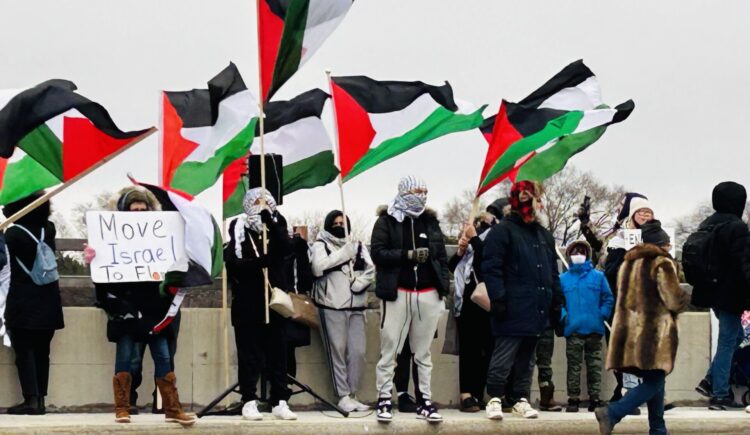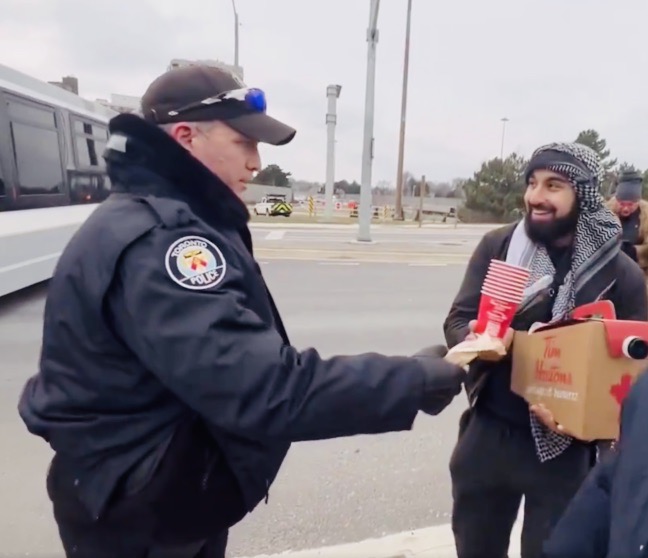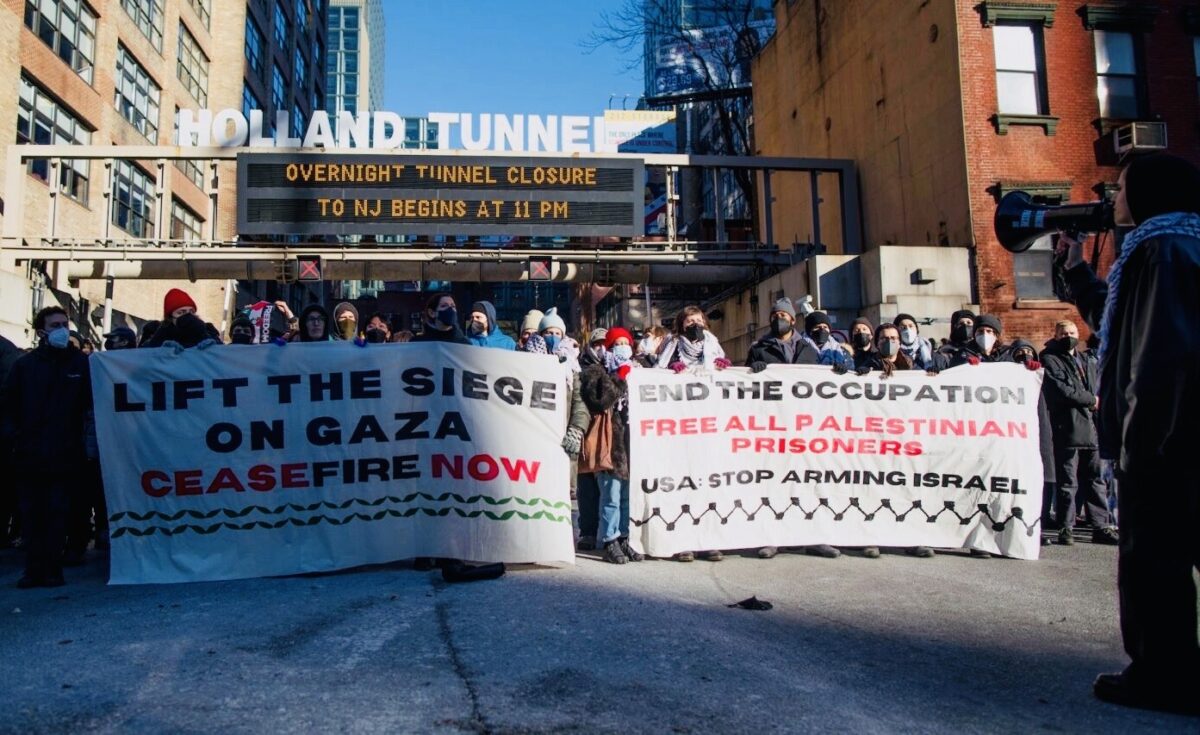Loud, aggressive and intimidating Palestinian protests supporting Hamas, demanding an immediate ceasefire in the Israel-Hamas war, and falsely accusing Israel of genocide have been proliferating like weeds in Canadian and American cities for more than three months now.
Frankly speaking, they have gotten out of hand, the sanctity of freedom of assembly and free speech notwithstanding.
The protesters, backed by an assortment of radicals and “progressives” in an intersectional show of unity, have showed up in a variety of public and private spaces running the gamut from shopping malls and highway overpasses to bridges and tunnels.
Much to the discomfort and anger of ordinary people, they have disturbed shoppers in Toronto’s Eaton Centre and disrupted traffic in front of New York City’s Holland tunnel.
And in the most egregious cases, they have vandalized the outdoor facade of the Indigo book store in Toronto and demonstrated in front of two cafes, Aroma and Cafe Landwer, under Jewish ownership in the same city.
Amid this turbulence, a Jewish-owned food shop in Toronto was recently firebombed, but no arrests have been made so far.
Protesters have even singled out Josh Matlow — a Toronto Jewish city councillor whose positions on the current conflict in the Middle East have been balanced — for criticism.
These unsettling incidents have occurred as Toronto police chief Myron Demkiw reports that antisemitic crimes have increased by 211 percent since Hamas terrorists attacked communities and army bases in southern Israel on October 7, killing 1,200 people.
Jews have been the targets of 53 percent of these hate crimes, he noted, saying that police have stepped up patrols in several neighborhoods to keep communities safe from hate.
One of the most controversial protests staged by Palestinians and their supporters in Toronto has been on the overpass at Avenue Road and Highway 410. Since this locale is very close to a Jewish neighborhood, some believe it was intentionally chosen to have a chilling effect on Jews
Police closed the busy intersection, thereby disrupting traffic, and banned the protesters from hanging pro-Palestinian banners along the overpass, which prompted Palestinians to accuse the police force of “bowing to Zionist interests.”

Protesters and pro-Israel counter-protesters have exchanged words. In one instance late last year, a Jewish woman was arrested after she made a throat-slitting gesture while waving an Israeli flag.
And in a bizarre incident which aroused widespread puzzlement and indignation, a police officer was photographed handing over cups of coffee to an Arab protester on behalf of nearby sympathizers who were stopped from joining him and his fellow travellers.

After the photograph was circulated on social media, Demkiw issued an apology. The Toronto Police Association, however, rushed to the defence of the officer, saying he was working to “keep the peace” and had been unfairly maligned.
On January 11, the police finally cracked down and banned protests at the site. “Moving forward, demonstrations or the congregation of individuals on the Avenue Road overpass will not be permitted,” said Demkiw. “People can expect to be arrested if necessary.”
Demkiw announced the news after a city councillor, citing safety concerns, presented a motion calling for an end to the protests. But several days later, police arrested three protesters at the overpass.
In the United States, Palestinian protesters have been just as vociferous in their determination to publicize their cause.
Earlier this month, during the rush hour in New York City, they shut down traffic on the Manhattan, Brooklyn and Williamsburg bridges and temporarily blocked the Holland tunnel under the Hudson River which connects Manhattan to New Jersey.
These protests were organized and attended by members of the Palestinian Youth Movement, the Democratic Socialists of America, the Jewish Voice for Peace, Writers Against the War on Gaza, Samidoun, Critical Resistance, Party for Socialism and Liberation, and Al-Awda: The Palestine Right to Return Coalition.
At all four locations, several hundred protesters could be heard chanting, “Free Palestine,” “Palestine will never die,” and “NYPD, KKK, IDF, they’re all the same,” in a reference to the New York Police Department, the Ku Klux Klan and the Israel Defence Forces.
In response, the New York Police Department issued a traffic advisory and by 11:30 a.m., the the protesters had been dispersed.
Nicole Gelinas, in a piece in City Journal, wrote, “They created gridlock that inconvenienced tens of thousands of drivers, bus riders, bike riders, and walkers. Following months of smaller-scale actions, it was the agitators’ most disruptive action yet — and organizers will continue to escalate their behavior unless Mayor Eric Adams and Governor Kathy Hochul make clear that blocking key transportation corridors is not ‘peaceful protest.’
“Protests on all sides of any issue are a fact of urban life. But protesters are not free to obstruct movement. The First Amendment protects only speech and assembly, not unlawful obstruction of roads, transit, or sidewalks.”
These protests unfolded as the Anti-Defamation League released a preliminary report indicating that antisemitic incidents in the United States have tripled in the three months since the October 7 atrocities in Israel.
The ADL found that 3,283 incidents occurred between October 7 and January 7 involving physical assault, vandalism and verbal or written harassment.
In addition, about 500 antisemitic incidents were recorded on American university campuses. The Department of Education’s Office of Civil Rights has opened dozens of investigations into allegations of discrimination at universities.
Tracking Palestinian rallies across the country, the ADL noted that 1,347 tolerated antisemitic rhetoric and expressions of support for terrorism against Israel.
It is crystal clear that the Israel-Hamas war has hardened Palestinian antipathy toward Israel and Jews and emboldened their allies to embrace the skewed Palestinian narrative of Israel’s protracted conflict with the Palestinians.
